Students’ Entrepreneurial Venture Receives Support from the UT Dallas CS Department
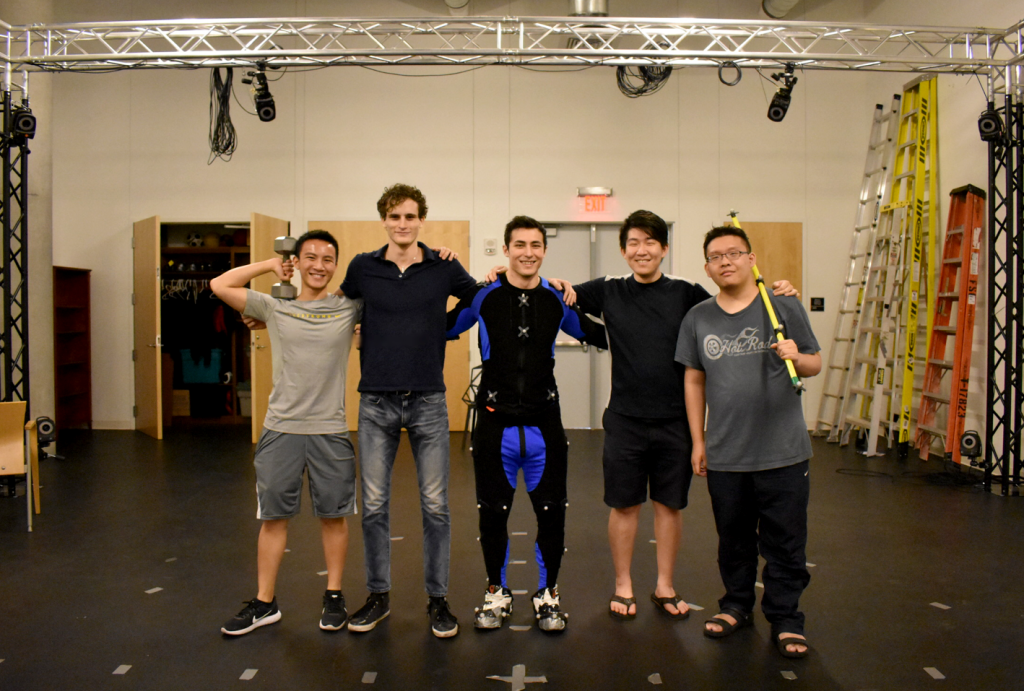
The UT Dallas Computer Science Department recently instituted the Software Startup Launch Track to motivate computer science and software engineering students to become entrepreneurs. Under this program, student engagement with entrepreneurship starts from the freshman or sophomore year itself, and culminates in a startup housed in UT Dallas’ incubator, called the Venture Development Center (VDC). CS Department provides partial financial support to startup companies under this program. Immosis, founded by software engineering majors Brian Hoang and Marwan Kodeih, is the first beneficiary. Immosis has also received help and support from UT Dallas’ Institute of Innovation and Entrepreneurship and its Blackstone Launchpad Program. We spoke to Brian, Immosis’ CEO, about Immosis and all the work they have been doing with virtual reality. Below is our conversation with him.
Can you tell me a little bit more about the history of your company/agency? How did it begin? Who is involved?
We started Immosis in December 2016 as a VR gaming studio with a title called Amelia’s Curse (still developing it today; should be released in June). Before Immosis, I had founded a couple of CS student organizations at UT Dallas – the Artificial Intelligence Society (AIS) and the Virtual Reality Society (VRS). I met my co-founder, Marwan Kodeih, when I was recruiting for the VRS and together we spun out our project efforts into Immosis.
How is the CS Department involved?
I’ve been close with Dr. Gupta and the CS faculty and staff since summer 2016 due to my work with the AIS and VRS. When Immosis started, we mostly collaborated with the UT Dallas Institute for Innovation and Entrepreneurship (IIE) (e.g., the Blackstone LaunchPad), but recently we have been communicating with the CS Dept more frequently. Currently, they are subsidizing our office space in the Venture Development Center (VDC) for a year. Marwan and I are CS and SE students at UT Dallas.
How long have you been working and developing this new agency?
It has been since December 2016, so we have been working at this for a little bit more than 15 months at this point.
Aside from games, what kind of immersive content are you and your team creating?
In 2017, we began to expand beyond gaming after figuring out how capable our team was and how versatile this technology was. We experimented with Augmented Reality (AR) mobile apps for fitness and dance training, and currently, we have client projects in the various fields ranging from healthcare to the events industry, which cater to large conventions. We’re actively working to diversify the industries that we impact with our immersive content.
When you go to the conventions what do you do? Any contests?
In 2017, we exhibited at SXSW, DreamHack, A-Kon, and AnimeFest. This year, we presented at PAX South and SXSW, with plans to revisit DreamHack and A-Kon in June. Exhibitions are always a great time because Amelia’s Curse is pretty good at attracting and engaging crowds. Plus, at these events we are presented with the opportunity to network with other companies and make meaningful business connections.
Also in 2017, we advanced to the final six startups out of 134 in UT Dallas’s Annual Big Idea Competition, where we got to pitch on stage to notable judges such as Guy Kawasaki and Bob Metcalfe. It was an extremely competitive and rigorous process; although we didn’t walk away with a prize that night, we walked away with greater confidence in our team. To advance to finals as the only team with a new idea was a major accomplishment, but not only were we able to pitch the app, we also demonstrated our technical execution by creating the prototype in such a short time.
What have you learned from this experience? What do you hope to gain from this?
If I tried to list out everything I’ve learned from Immosis, I’d probably end up with a short novel. Running a startup is like drinking from a firehose. You’re constantly wearing many hats and adapting to new situations. I’ve learned about various aspects of the business, including marketing, sales, pitching, management, legal docs, VR/AR software development, and 3D art. The learning never ends, but that’s a good thing!
In the end, I aim to build a sustainable business with a practical business model. We have an extraordinary team that deserves to be rewarded for their time, effort, and faith in our company. We’ll test and pivot as many times as it takes. We came here to win!
What do you see for the future of your agency?
Right now we’re very services-based in order to bring in revenue as we continue to experiment with products. In the future, we’d like to be mainly product-based because that’s significantly more scalable. However, in the meantime, we’re still enjoying our work with clients. Regardless, the heart of our company will always be a passion for creating absurdly immersive experiences for the world to see.
Below are a few photos that brian shared with us.
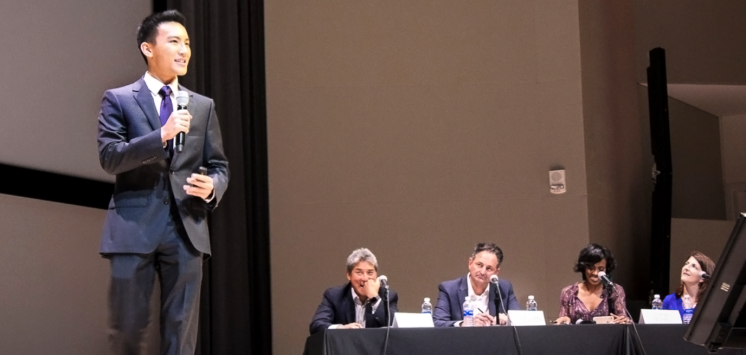
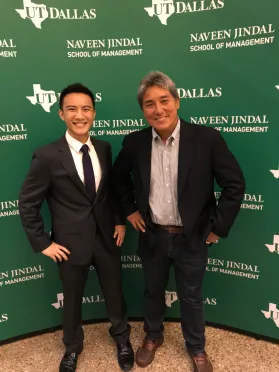
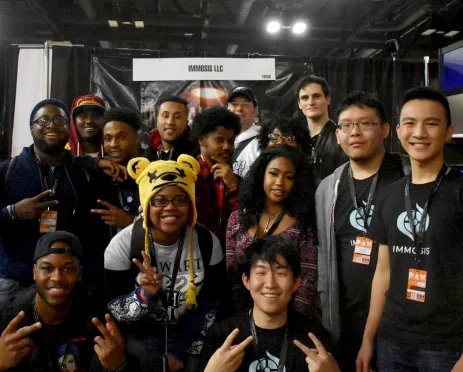
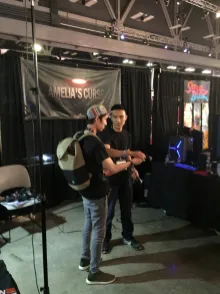
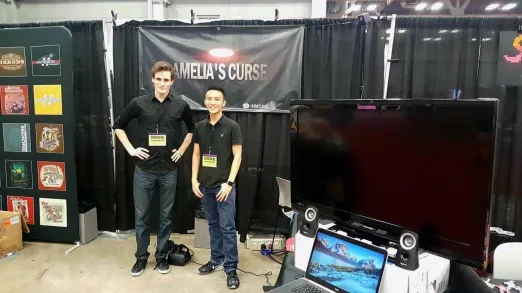
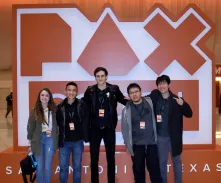
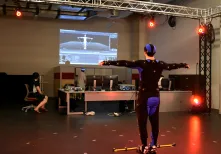
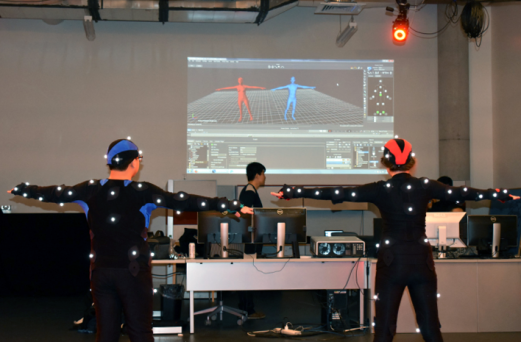
Click here to learn more about Immosis
Duo Develops Virtual Reality Game, Business with Campus Resources
Via UT Dallas News Center – Two University of Texas at Dallas students are turning a virtual reality horror game into a thriving technology business.
Brian Hoang, a software engineering senior, and Marwan Kodeih, who graduated this spring with a bachelor’s degree in computer science, successfully developed video games together using virtual reality (VR). The pair recognized the potential for something bigger, which led to the founding of Immosis and dreams of success beyond just creating games.
Putting Their Skills to Use
Hoang said he is most comfortable when working. As a sophomore, he interned at a large defense company but was disappointed by the lack of creativity and dull atmosphere. Determined to stoke his “entrepreneurial spark,” he created the Artificial Intelligence Society student group in July 2016. The club brought in tech enthusiasts, programmers and business-minded students to talk about the future of the industry. It attracted more than 500 members in its first year.
Click here to view the rest of the article
ABOUT THE UT DALLAS COMPUTER SCIENCE DEPARTMENT
The UT Dallas Computer Science program is one of the largest Computer Science departments in the United States with over 2,400 bachelors-degree students, more than 1,000 master’s students, 150 Ph.D. students, 53 tenure-track faculty members and 38 full-time senior lecturers, as of Fall 2017. With The University of Texas at Dallas’ unique history of starting as a graduate institution first, the CS Department is built on a legacy of valuing innovative research and providing advanced training for software engineers and computer scientists.




